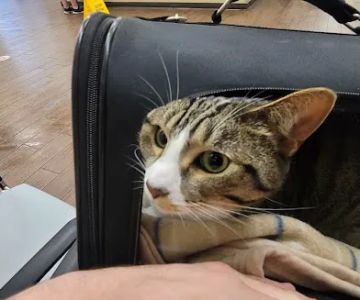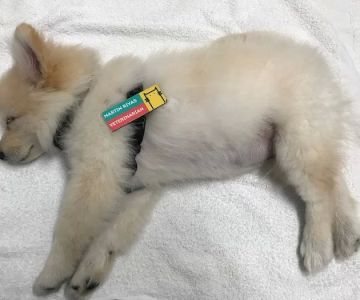- 1-How-to-Help-Pets-Cope-With-Fireworks-Thunderstorms-and-Storms-#how-to-help-pets-cope-with-fireworks-thunderstorms-and-storms
- 2-Understanding-Pet-Anxiety-During-Storms-and-Fireworks-#understanding-pet-anxiety-during-storms-and-fireworks
- 3-Practical-Tips-for-Calming-Pets-#practical-tips-for-calming-pets
- 4-When-to-Seek-Professional-Help-for-Pet-Anxiety-#when-to-seek-professional-help-for-pet-anxiety
- 5-Additional-Strategies-to-Reduce-Stress-in-Pets-#additional-strategies-to-reduce-stress-in-pets
1. How to Help Pets Cope with Fireworks, Thunderstorms, and Storms
For many pets, loud noises from fireworks, thunderstorms, and storms can trigger intense anxiety and fear. These experiences often leave pet owners feeling helpless as they watch their furry friends struggle. But with the right knowledge and strategies, you can help your pet feel more at ease during these stressful events. In this article, we will explore ways to help pets cope with these frightening sounds and provide tips for reducing their anxiety.
2. Understanding Pet Anxiety During Storms and Fireworks
Pet anxiety during thunderstorms and fireworks is a common issue, and it’s essential to understand why pets react the way they do. Many pets, especially dogs, have heightened sensitivity to loud noises and can easily become overwhelmed by the sounds of storms or fireworks. This anxiety may manifest as shaking, hiding, drooling, excessive barking, or even destructive behavior.

468 Cassat Ave, Jacksonville, FL 32254, USA
See Details2.1 The Science Behind Pet Anxiety
Pets’ hearing is much more acute than humans', and they can hear frequencies that are imperceptible to us. Thunderstorms and fireworks generate loud, high-pitched sounds that can cause confusion and fear. The vibrations in the air during a storm or the sudden bursts of noise from fireworks can also create discomfort, triggering anxiety responses in pets.
2.2 Common Signs of Anxiety in Pets
Recognizing signs of anxiety in your pet is the first step in managing their fear. Symptoms of anxiety during storms or fireworks include:
- Shaking or trembling
- Excessive barking or whining
- Seeking refuge in small spaces, such as under furniture or in closets
- Drooling or panting excessively
- Trying to escape or damage furniture
Understanding these signs can help you take timely action to calm your pet before their anxiety worsens.
3. Practical Tips for Calming Pets
There are several strategies you can use to help your pet feel calmer during storms, fireworks, and other anxiety-inducing events. Below are some practical tips for managing your pet’s fear:
3.1 Create a Safe Space
One of the most effective ways to calm an anxious pet is by creating a safe space for them to retreat to during a storm or fireworks display. This space should be quiet, dimly lit, and free from external noise. For dogs, a crate with soft bedding can be a comforting place. For cats, a cozy nook or even a closet can work well.
3.2 Use Calming Products
There are various calming products available that can help alleviate pet anxiety. These include:
- Calming collars, which emit pheromones that mimic the comfort scent of mother dogs
- Calming music or white noise machines to mask the sound of thunderstorms and fireworks
- Herbal remedies or prescription medications prescribed by your vet
- Anxiety wraps, such as the ThunderShirt, which apply gentle pressure to your pet’s body and help them feel more secure
Many pet owners find these products helpful, especially when combined with other calming techniques.
3.3 Desensitize Your Pet to Loud Noises
Gradually desensitizing your pet to loud noises can help reduce their anxiety over time. You can do this by playing recordings of fireworks or thunderstorms at a low volume and gradually increasing the volume as your pet becomes more accustomed to the sound. This technique can take time but is effective for some pets in the long term.
3.4 Keep Your Pet Distracted
During loud events, keeping your pet distracted can be an effective way to prevent them from focusing on the noise. You can offer them a favorite toy, engage them in play, or provide a tasty treat. For dogs, puzzle toys filled with treats can keep them occupied for longer periods, taking their mind off the external noise.
4. When to Seek Professional Help for Pet Anxiety
While the tips above can help many pets, some pets experience such severe anxiety that these strategies may not be enough. If your pet’s anxiety is causing them to harm themselves or becoming a persistent issue, it may be time to consult a veterinarian or a professional animal behaviorist.
4.1 When to Consult Your Veterinarian
If your pet’s anxiety is severe, you may need to seek professional help. A veterinarian can help determine whether your pet's anxiety is part of a larger health issue, and they may prescribe medications or recommend therapy to help calm your pet.
4.2 Animal Behaviorists
For pets with deep-seated anxiety, an animal behaviorist can work with you to develop a treatment plan tailored to your pet’s specific needs. These professionals can provide valuable advice on behavior modification techniques and help you manage your pet’s anxiety over time.
5. Additional Strategies to Reduce Stress in Pets
In addition to the immediate calming techniques, there are long-term strategies to help reduce your pet's stress and anxiety. These strategies can also be useful in preventing future anxiety episodes caused by storms or fireworks.
5.1 Consistent Exercise and Playtime
Regular physical activity helps release pent-up energy and can reduce anxiety in pets. Ensure that your dog or cat gets enough exercise, especially before anticipated stressful events like storms or fireworks. For dogs, daily walks and playtime can help burn off energy and make them more likely to relax during stressful situations.
5.2 Positive Reinforcement Training
Training your pet with positive reinforcement can also help build their confidence. When your pet reacts calmly during stressful events, reward them with treats or affection. This can help them associate loud noises with positive experiences and reduce anxiety in the future.
If you’re seeking products to help your pet cope with anxiety, consider exploring the selection at Hidden Brook Veterinary. We offer a range of calming products, from anxiety wraps to calming collars, that can help soothe your pet during loud events.











